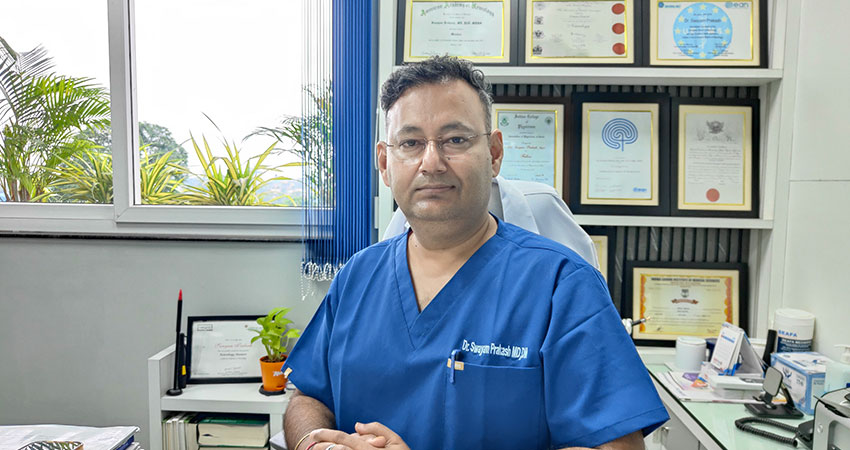
Experience top-tier neurological care with Dr. Swayam Prakash, a distinguished Senior Consultant Neurologist in Siliguri. Dr. Prakash specializes in the diagnosis and treatment of a broad spectrum of neurological conditions, including Alzheimer's disease, Parkinson's, multiple sclerosis, epilepsy, and more. Committed to delivering compassionate, personalized care, Dr. Prakash is dedicated to improving your quality of life through expert medical attention.
Since 1998
In Healthcare
15,000+
Patients Served
50+
Research & Development Projects
100+
Publications & Presentations


Migraine and Headaches
Epilepsy
Stroke
Parkinson's / Other Movement Disorders
Alzheimer's Disease / Other Dementias
Backaches and Spine Diseases
Myasthenia
GBS / CIDP
MS/NMO
Neuropathies & Myopathies
Motor Neuron Diseases
Other Neurological Disorders
Dr Swayam Prakash is an exceptional Neurologist. Once an Airforce Officer's father was in critical stage and the officer was left with no Hope. He was taken to Neotia hospital were I approached Dr Swayam who was outside. He rushed to the hospital and took over charge of the patient. From a lost case he made sure that the patient is fighting fit even today. His sincerety., Profesionalism and dedication is beyond words. He is always cheerful and is like a God on earth. I Salute himðŸ™
According to me Dr. Swayam Prakash is the best neurologist in Siliguri, my wife got well within a month of his treatment.
Dr. Swayam Prakash sir did a great job with my first ever health exam. He explained everything to me in a very clear manner. He was also kind and friendly. All of the staff was great - they were helpful. Doctor wrote me minimum medicine.
Dr. Swayam Prakash is THE BEST DOCTOR and a GREAT HUMAN BEING I had ever come across. His relentless service towards his patients , his sound psychological counseling to the patient party, his zeal and confidence to pull out his patients from the darkness of untold sufferings and to serve the humanity at large are beyond any praise. My heart felt gratitude towards him.
Dr Swayam Prakash is an exceptional Neurologist. Once an Airforce Officer's father was in critical stage and the officer was left with no Hope. He was taken to Neotia hospital were I approached Dr Swayam who was outside. He rushed to the hospital and took over charge of the patient. From a lost case he made sure that the patient is fighting fit even today. His sincerety., Profesionalism and dedication is beyond words. He is always cheerful and is like a God on earth. I Salute himðŸ™
According to me Dr. Swayam Prakash is the best neurologist in Siliguri, my wife got well within a month of his treatment.
Dr. Swayam Prakash sir did a great job with my first ever health exam. He explained everything to me in a very clear manner. He was also kind and friendly. All of the staff was great - they were helpful. Doctor wrote me minimum medicine.
Dr. Swayam Prakash is THE BEST DOCTOR and a GREAT HUMAN BEING I had ever come across. His relentless service towards his patients , his sound psychological counseling to the patient party, his zeal and confidence to pull out his patients from the darkness of untold sufferings and to serve the humanity at large are beyond any praise. My heart felt gratitude towards him.
The term Dementia is derived from Latin stock, meaning without mind. According to DSM fourth edition, text revision, dementia refers to multiple cognitive deficits that involves memory impairment, and one or more of the following, viz. language disturbance (aphasia), impairment in carrying out skilled motor activities despite intact motor functions (apraxia), deficits in recognizing familiar persons or object despite intact sensory function (agnosia), impairment in planning, initiating, organizing, and abstract reasoning (executive dysfunction).
DSM-5 replaced the term dementia with neurocognitive disorder, which has further been categorized major or minor depending upon the needs of assistance for daily activities. It also obviated the need of memory impairment to qualify the definition of the disorder.
Alzheimer’s disease (AD) is the most common form of dementia and accounts for nearly 60-70% of all cases. As per a current estimate AD affects over 35 million people worldwide.
Vascular dementia (VaD), Fronto-temporal dementia (FTD), Corticobasal degeneration (CBGD), Diffuse lewy body dementia (DLBD) etc. are other important forms of dementia.
Age is perhaps the most important risk factor, as prevalence rate doubles every five years after age 65. Other important risk factors are postmenopausal women, lower intelligence, fewer year of education, traumatic brain injury, and many medical and psychiatric conditions eg. Diabetes, hypertension, stroke, MI, dyslipidemia, obesity, chronic stress, depression etc. There are some genetic risk factors also like Presenilin 1&2, APP, APOE genes etc.
Compassionate Care, Cutting-Edge Treatments.
Need a consultation or looking for a second opinion?
Call +91 97337 87000